6 Scientific Terms All Business People Should Know
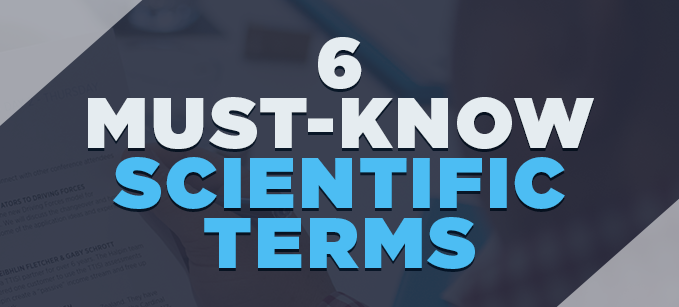
Many people think that science is only for scientists — those quaint folk dressed in white lab coats who work with chemical formulas and don't see much sunshine.
However, it’s important to remember that science, as a body of principles and practices, is the most trusted structure ever invented by the smartest minds in all human history to solve problems. And, if nothing else, business is problem solving.
Below are six basic scientific terms that all business people should understand.
1. The Scientific Method
The scientific method does not have an “official” set of steps but is rather more like a general set of principles than an exact process. For this reason, you can find many different descriptions and interpretations among scientists. At a fundamental level, the scientific method is the intelligent use of trial and error. There are at least four basic questions that can be asked in the process:
- Goal (what problem are you trying to solve?)
- Develop hypothesis (what’s your best guess based on the current evidence?)
- Test hypothesis (what experiment can you perform?)
- Analyse results (what did you learn from the experiment?)
A slightly more detailed outline of the scientific method:
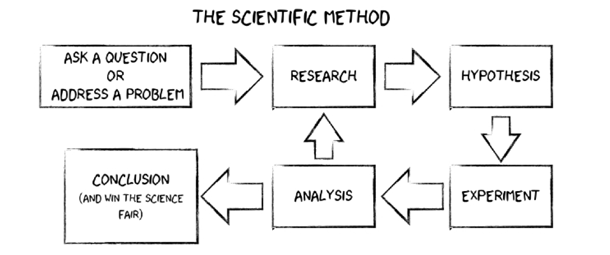
For example, if online marketers wanted to understand the most popular types of article headlines to improve their open rates, they could apply the scientific method. By sending emails to different audience segments in their database using different word combinations, they could determine which email subject lines achieved the highest number of opens and then revise their approach to future headlines based on the experiment.
2. Inductive and Deductive Reasoning
There are two main types of reasoning. Deductive reasoning starts with general rules, facts or laws and proceeds to generate specific conclusions. Inductive reasoning works in the opposite direction: by starting with specific examples or observations and then generating general rules, facts or laws. In deductive reasoning, if the premises are true, the conclusion must necessarily be true. In inductive reasoning, if the premises are true, the conclusion is not necessarily true but it helps to offer probable support for the conclusion.
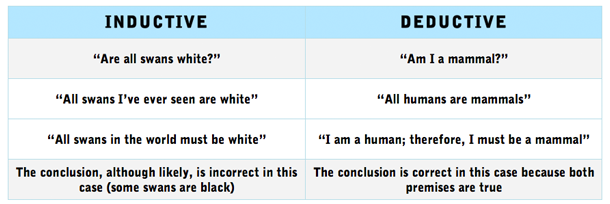
These two types of reasoning are contrasted in The Matrix Reloaded (2003). The Merovingian's strength is deductive reasoning whereas the Oracle’s strength is inductive reasoning. The Merovingian has a deterministic view of the world based upon causality (the power of hindsight). The Oracle is described as an “intuitive” computer program able to predict human behaviour based on inference and probability (the power of foresight). The Merovingian describes the Oracle pejoratively as a "fortune teller"; however, he later reveals that he secretly wishes for the “eyes of the Oracle”, which he believes will make him extremely powerful.
For example, in both classroom teaching and business eLearning it is very common for course designers to focus on the deductive approach to training: starting with rules, theory and established facts that the learner is expected to memorise as their starting point. The learner’s recall would then be tested with an assessment at the end of the course. An inductive approach to training, on the other hand, might start with specific examples or stories that allow the learners to infer possible answers and have discussions with others in their group to generate their own theories, facts or rules that could later be tested.
3. Burden of Proof
“Gentlemen, practise these words in front of the mirror: Although we are constantly exploring the subject, currently there is no direct evidence that links cellphone usage to brain cancer”.—Nick Naylor, Thank You for Smoking (2005)
“Burden of proof” means that the responsibility falls to the person making a scientific claim to provide evidence to support it. This standard is generally applied in criminal law, whereby if one is accused of a crime then one is assumed innocent until enough evidence is produced to overcome reasonable doubt. The tobacco industry infamously used this scientific principle to their advantage for decades to create uncertainty over the causal link between smoking and lung cancer by claiming that it was up to their opponents to produce more rigorous evidence to support their accusations.
4. Correlation Does Not Imply Causation
There’s an important concept in statistics often summed up by the phrase “correlation does not imply causation”. Just because two trends appear to fluctuate in unison, it doesn’t necessarily mean that one is directly influencing the other. Correlations can help to provide supporting evidence, but to establish a causal relationship between two factors, one would ideally need to conduct an experiment with a control group to isolate the role a specific factor.
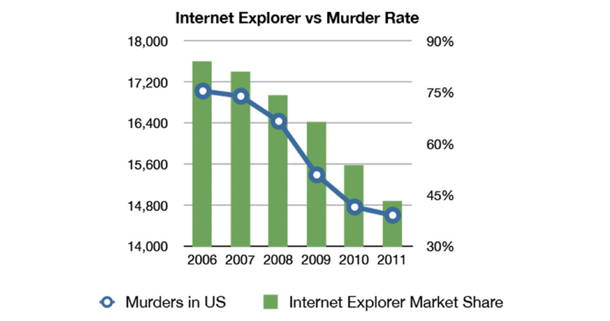
High employee engagement scores are often shown to correlate with better financial performance. However, there is a long-standing argument over which causes which: Do engaged employees create financial success, or does financial success spark engagement? Gallup analysed this question in 2010 and were able to support the case for causation.
5. Confirmation Bias
Confirmation bias is the tendency of humans to favour information that confirms their prior beliefs, assumptions or attitudes, and ignore or overlook information that doesn’t.

One of the reasons why Jim Collin's bestselling book, Good to Great (2001), is held in high regard is that he went to great lengths to avoid confirmation bias in his research. Unlike many books on business and leadership success, the author did not set out with a pre-determined theory already in mind that he sort to find stories and examples to support. By not having a specific agenda or an attachment to a particular idea, Collins and his research team could allow the data to speak for itself.
6. Falsifiability
In science, no claim or theory about the natural world can ever be “proven” in an absolute sense because of the limits of human methods and understanding. However, theories can be disproven through the principle of falsification, which allows scientific theories to advance their case and eventually gain acceptance. Falsifiability refers to the capacity of a claim to be tested. If a claim is unfalsifiable — that is, not capable of being measured or tested through any kind of observation or physical experiment — then the claim would be not considered scientific.

When writing business plans, it is common for entrepreneurs to set unclear, untestable goals, which can mean that a business gets “dragged through the mud” for years before it is clear whether or not the business model is viable. With the practice of “lean startups”, entrepreneurs will attempt to falsify or verify a specific business model with the least amount of effort/resources/financing possible to determine whether the model has potential to continue or should be abandoned (i.e., "minimum viable product"). The principle of falsification is used to help create testable conditions under which a hypothesis can be proved or disproved QUICKLY.

Theo Winter
Client Services Manager, Writer & Researcher. Theo is one of the youngest professionals in the world to earn an accreditation in TTI Success Insight's suite of psychometric assessments. For more than a decade, he worked with hundreds of HR, L&D and OD professionals and consultants to improve engagement, performance and emotional intelligence of leaders and their teams. He authored the book "40 Must-Know Business Models for People Leaders."

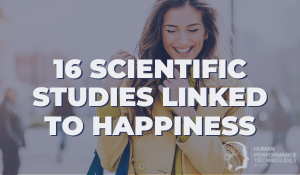
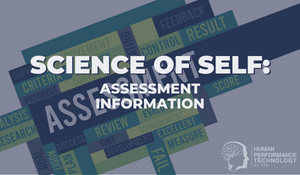
We Would Like to Hear From You (0 Comments)